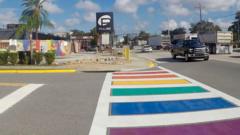Why Did Florida Remove the Rainbow Crosswalk Honoring Pulse Nightclub Victims?

In a contentious move, Florida's Department of Transportation has painted over a rainbow crosswalk in Orlando that commemorated the victims of the 2016 Pulse nightclub shooting. This action has provoked outrage from local officials and advocates, who view it as a politically motivated attack on a symbol of remembrance and LGBTQ+ rights.
Last updated: 25 October 2023 (BST)
Key Takeaways
- The rainbow crosswalk was part of a memorial for the 49 victims of the Pulse nightclub shooting in 2016.
- Orlando Mayor Buddy Dyer condemned the removal as a "cruel political act".
- Florida's transportation agency has threatened cities with funding cuts if they maintain rainbow crosswalks.
- The controversy highlights growing tensions over LGBTQ+ rights in Florida under Governor Ron DeSantis.
- US Transportation Secretary Sean Duffy has called for the removal of political statements from public roads.
Background of the Pulse Nightclub Shooting
The tragic events at the Pulse nightclub on 12 June 2016 shook not only the local community but the world. A gunman opened fire, killing 49 people and injuring 53 others, making it the deadliest mass shooting in US history at that time. In response, the city of Orlando initiated various memorials, including the rainbow crosswalk, to honour the victims and promote inclusivity.
The Significance of the Rainbow Crosswalk
Installed as part of a broader effort to honour the victims, the rainbow crosswalk became a symbol of solidarity with the LGBTQ+ community. It enhanced pedestrian safety and served as a visual reminder of Orlando’s commitment to remember those lost. Mayor Buddy Dyer expressed his devastation over its removal, stating that the crosswalk was a crucial part of the memorial.
Political Context
The removal of the rainbow crosswalk has been framed within a larger political narrative in Florida. Governor Ron DeSantis, a prominent Republican figure, has faced criticism for his administration’s perceived hostility towards LGBTQ+ issues. His administration has pushed for laws that restrict discussions around sexual orientation and gender identity in educational settings, which has been labelled as part of a broader "culture war".
Controversy Surrounding the Removal
State Senator Carlos Guillermo Smith, an openly gay representative, stated that the repainting of the crosswalk occurred without notification or approval from the city of Orlando, describing it as "illegal vandalism". He expressed disbelief that the DeSantis administration would engage in such actions against a city memorial. Smith's comments reflect a growing frustration among local leaders concerning state-level interference in municipal matters.
State Agency Actions and Responses
In recent months, Florida’s transportation agency has been actively notifying cities about the removal of rainbow crosswalks, threatening to withhold transportation funding for non-compliance. A memo issued in June prohibited surface art associated with any "social, political or ideological messages", asserting that such designs do not fulfil traffic control purposes.
In response to the growing controversy, US Transportation Secretary Sean Duffy issued a letter to all states, reinforcing the idea that public roads should remain free of political statements. He stated that taxpayer funds should be utilised to ensure safe streets rather than for "rainbow crosswalks".
Public Reactions and Implications
The removal has sparked significant backlash from both local residents and LGBTQ+ advocates. Public figures, including Mayor Dyer and Senator Smith, have taken to social media to express their outrage, framing the act as an affront to the community’s memory and rights. Many local residents view the rainbow crosswalk as a necessary component of their city's identity and a beacon of hope for the LGBTQ+ community.
The Broader Impact on LGBTQ+ Rights in Florida
This incident fits into a broader pattern of legislative and social actions in Florida that many perceive as targeting LGBTQ+ rights. The so-called "Don't Say Gay" law has drawn national attention, with critics arguing that it marginalises LGBTQ+ individuals and hampers necessary discussions on sexual and gender diversity in schools. The removal of the crosswalk may be seen as part of a larger agenda to erase symbols of LGBTQ+ acceptance and remembrance.
What Happens Next?
The future of memorials like the rainbow crosswalk in Florida is uncertain. With state officials enforcing regulations against such displays, cities may face difficult choices between local identity and compliance with state directives. Community leaders and LGBTQ+ advocates are likely to continue their fight for representation and remembrance, potentially leading to a surge in activism against perceived injustices.
The ongoing conflict raises significant questions about the role of public symbols in representing diverse communities and the extent to which state governments can influence local decisions regarding memorials and public art. As tensions rise, the outcome of this situation may set important precedents for similar disputes across the United States.
Conclusion
The removal of the rainbow crosswalk in Orlando is more than just a local issue; it is part of a larger narrative concerning LGBTQ+ rights and political expression across the United States. As communities grapple with these challenges, the importance of remembering and honouring diverse identities remains paramount. Will cities continue to stand firm against state mandates, or will they yield to political pressure? The answer may shape the future of public representation in Florida and beyond.
FAQs
What was the purpose of the rainbow crosswalk in Orlando?
The rainbow crosswalk was designed to memorialise the 49 victims of the Pulse nightclub shooting in June 2016 and to serve as a symbol of support for the LGBTQ+ community.
Why was the rainbow crosswalk removed?
The Florida Department of Transportation painted over the crosswalk as part of a broader initiative to eliminate what they described as political or ideological messages from public roads.
What has been the reaction to the removal of the crosswalk?
Local officials, including Orlando Mayor Buddy Dyer and state Senator Carlos Guillermo Smith, have expressed outrage, labelling the act as politically motivated and an affront to the city's commitment to honouring the victims.
How does this relate to LGBTQ+ rights in Florida?
The removal of the crosswalk is seen as part of a larger pattern of actions by the Florida government that critics argue undermine LGBTQ+ rights and visibility, including the controversial "Don't Say Gay" law.
What could happen next regarding the rainbow crosswalk issue?
The future of such memorials remains uncertain. Local leaders may continue to advocate for their preservation, while state officials may impose stricter regulations, leading to potential conflicts.
Published: 2025-08-21 22:35:11 | Category: wales



